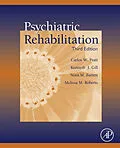The third edition of Psychiatric Rehabilitation, discusses interventions to help individuals with mental illness improve the quality of their life, achieve goals, and increase opportunities for community integration so they can lead full and productive lives. This person centered approach emphasizes strengths, skill development, and the attainment of valued social roles. The third edition has been fully updated with new coverage indicating how to address medical problems while treating for mental illness, wellness and recovery, evidence based practices, and directions for future research. Retaining the easy to read, engaging style, each chapter includes key terms with definitions, case studies, profiles of leaders in the field, special issues relating to treatment and ethics, and class exercises. Providing a comprehensive overview of this growing field, the book is suitable as an undergraduate or graduate textbook, as well as a reference for practitioners and academic researchers. Special Features: - Provides new coverage on comorbid medical disorders, evidence based practices, wellness and recovery, and direction for future research - Identifies controversial issues relating to treatment and ethics - Supplies case study examples to illustrate chapter points - Highlights key terms with definitions and key topics - Offers focus questions and class exercises as a teaching tool - New coverage of DSM-V diagnosis, evidence-based treatment, and daily living skills training - Retains case studies, boxed controversial issues, glossary
Autorentext
Nora Barrett is an Associate Professor in the Rutgers Department of Psychiatric Rehabilitation and Counseling Professions and Director of the Bachelor of Science Degree program in Psychiatric Rehabilitation and Psychology. She is responsible for overseeing the program's curriculum and ensuring that it reflects current best practices in the field. She has more than 20 years of experience teaching psychiatric rehabilitation courses. She frequently presents at conferences, provides consultation and training on topics such as individualized recovery planning and ethical practice, and has published a number of articles. She has served on the Board of the United States Psychiatric Rehabilitation Association and its New Jersey affiliate, NJPRA. She is also a founding member of the Consortium of Psychiatric Rehabilitation Educators. She is an active advocate for recovery-oriented services and the credentialing of psychiatric rehabilitation providers. Professor Barrett also worked for more than a decade as a direct practitioner, clinical supervisor and mental health administrator.
Klappentext
The third edition of Psychiatric Rehabilitation, discusses interventions to help individuals with mental illness improve the quality of their life, achieve goals, and increase opportunities for community integration so they can lead full and productive lives. This person centered approach emphasizes strengths, skill development, and the attainment of valued social roles. The third edition has been fully updated with new coverage indicating how to address medical problems while treating for mental illness, wellness and recovery, evidence based practices, and directions for future research. Retaining the easy to read, engaging style, each chapter includes key terms with definitions, case studies, profiles of leaders in the field, special issues relating to treatment and ethics, and class exercises. Providing a comprehensive overview of this growing field, the book is suitable as an undergraduate or graduate textbook, as well as a reference for practitioners and academic researchers.
Special Features:
- Provides new coverage on comorbid medical disorders, evidence based practices, wellness and recovery, and direction for future research
- Identifies controversial issues relating to treatment and ethics
- Supplies case study examples to illustrate chapter points
- Highlights key terms with definitions and key topics
- Offers focus questions and class exercises as a teaching tool
- New coverage of DSM-V diagnosis, evidence-based treatment, and daily living skills training
- Retains case studies, boxed controversial issues, glossary
Inhalt
Part 1: Understanding the Nature of Severe Mental Illness 1. The Experience of Mental Illness 2. Symptoms and Etiology of Serious Mental Illness 3. Course, Treatment, and Outcome of Severe Mental Illnesses
Part 2: Psychiatric Rehabilitation Principles and Methodology 4. The Goals, Values, and Guiding principles of Psychiatric Rehabilitation 5. Psychiatric Rehabilitation Methods
Part 3: Applications of Psychiatric Rehabilitation Principles and Methodology 6. Health and Wellness 7. Psychiatric Day Programming 8. Assertive community Treatment and Case Management 9. Co-occurring Disorders and Integrated Treatment 10. Employment 11. Supported Education 12. Residential Services and Independent Living 13. Self-help and Peer-delivered Services 14. The Role of the Family in Psychiatric Rehabilitation 15. Psychiatric Rehabilitation in Acute Care and Hospital Settings
